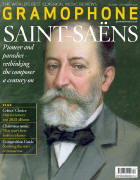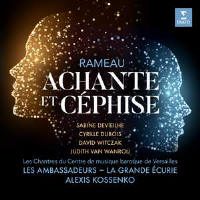Texte paru dans: / Appeared in: |
|
 |
Outil de traduction |
|
Reviewer: David Vickers The pastorale-héroïque Acante et Céphise – the first name misprinted ‘Achante’ in the composer’s uncorrected first proof of the printed score – was originally produced at the Académie Royale de Musique (the original Paris Opéra) in 1751 during celebrations of the birth of the Duke of Burgundy (grandson of Louis XV), but after a run of 14 performances it was never revived. Based on Middle Eastern myths that convey more than a whiff of Freemasonry akin to The Magic Flute, the librettist Jean François Marmontel added the alternative title La sympathie (‘Empathy’). This refers to the telepathic powers of talismanic bracelets given by the benign fairy Zirphile to the lovers Acante and Céphise, so that they can sense each other’s emotions even when separated, and it helps them to endure trials and torture by the malevolent genie Oroès (who lusts after Céphise). The journey of initiation and overcoming trials ends with Zirphile announcing the birth of a Bourbon hero – the splendid celebrations of the extended finale already evident from the outset of the opera’s astonishing Overture, its sections labelled ‘The Wishes of the Nation’ (a solemn invocation), ‘Tocsin’ (an alarm bell), ‘Fireworks’ (featuring thumping cannon fire for extra realism and blaring horns), and ‘Fanfare’ (quoting the acclamation ‘Long live the king’). On the subtler end of musical notability, the score contains the earliest surviving clarinet parts in French opera. Ballets are integrated more than usual into the plot, a pair of piquant musettes play in a pastoral divertissement (Act 2 scene 4), and an ebullient hunting divertissement (Act 2 scene 6) has beguiling wind band dances that exploit four horns and the clarinets in ways that foreshadow later Viennese Harmoniemusik. The critical Rameau Opera omnia edition by Sylvie Bouissou and Robert Fajon was published in 1998 but has waited until now to be performed. Alexis Kossenko and Les Ambassadeurs ambitiously replicate the constitution, layout and low pitch (approximately A=400) of the Paris Opéra orchestra in the 1750s: among the 53 players are four flutes, four oboes, four bassoons and nine cellos; two specialist holeless trumpeters double up on horns; six players across the string and woodwind sections are students from the early music department at Paris Conservatoire. Three pairs of clarinets in different keys were built especially for the project. The harpsichordist does not play in symphonies, dances or choruses – customary practice in Rameau’s time but a rare experiment in modern performances. The rich breadth of sonorities from the large orchestra is exceptional, and Kossenko’s superb players take in their stride every ingenious surprise and intricate detail that Rameau throws at them. The special qualities of this outstanding recording extend to perfect casting of the four principal roles. Sabine Devieilhe’s dulcet phrasing and emotive expression are perfect for the resolute Céphise and Cyrille Dubois is on ardent form as Acante; their impassioned duets have impressive fluidity and dexterity, and neither has fully fledged arias until they take turns with showpieces in the celebratory finale – Acante’s extravagant tour de force ‘Aigle naissant, lève les yeux’ has braying horns and Céphise’s sublime invocation of sunrise in ‘Lance tes feux, naissante Aurore’ is introduced by unfurling strings and bassoons. David Witczak is boldly sinister as the jealous Oroès, and Judith van Wanroij sings with spirited eloquence as Zirphile. Six other members of the cast contribute vivid turns as a fairy (sidekick to Zirphile), feverish followers of Oroès, priestesses of Cupid, a shepherd and shepherdess and hunters; they also reinforce the full-blooded chorus of 24 students from the Centre de Musique Baroque de Versailles. The resonant acoustic of Notre-Dame-du-Liban is a touch boomy when textures are turbulent or busy but proceedings charged with vivacious theatricality are also invested with considerable finesse. Not your average opera recording in any respect, this enthralling triumph at long last fills one of the major lacunae in the Rameau discography. |
|




